Why Green Tea Is Good for You: A Comprehensive Review
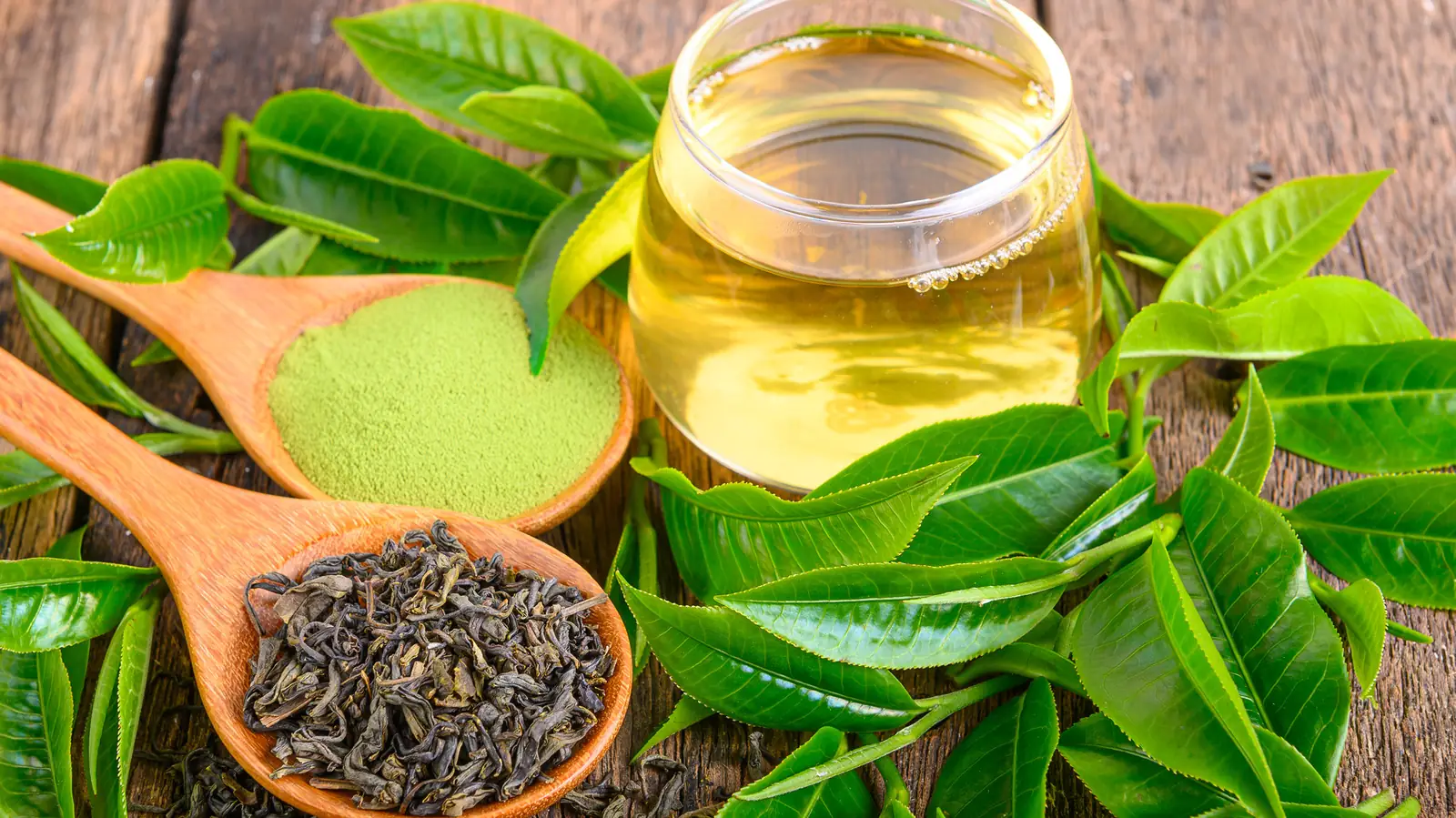
A tangy drink that comes from China, India, and Japan, green tea is one of the most popular beverages on the planet. Why green tea is good for you? Does it contain caffeine? Can it extend your life? Can it help you lose weight?
Read on, and you will find the answers to all these and numerous other questions.
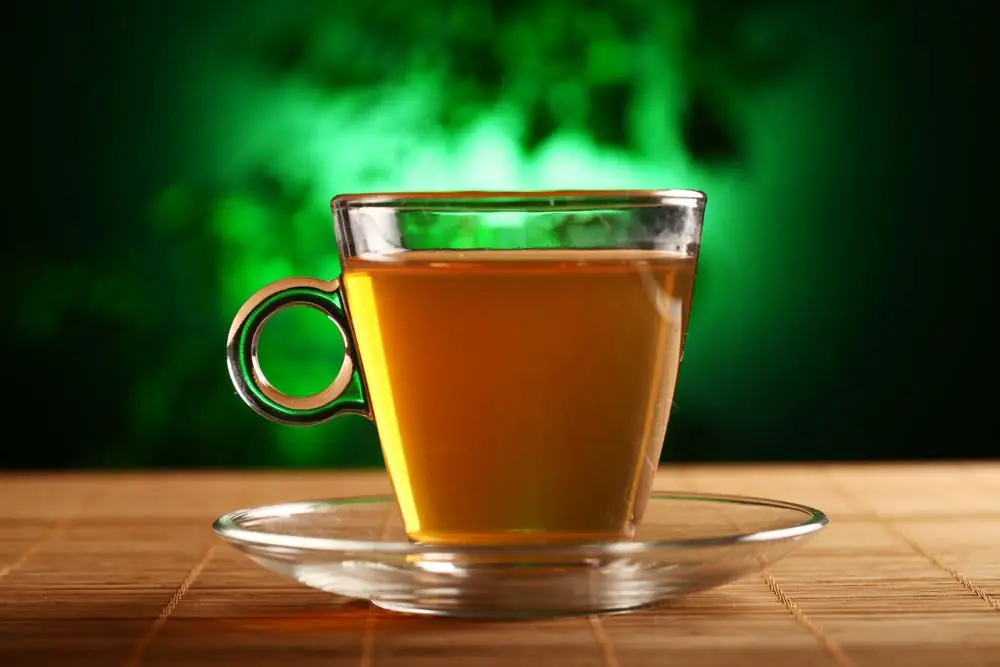
What Are the Benefits of Drinking Green Tea?
This beverage is good for your health in a number of ways:
- It contains copious quantities of L-theanine, a well-known compound that promotes relaxation. Numerous studies demonstrate that L-theanine promotes the activity of GABA, an important neurotransmitter that reduces anxiety while also making you more focused and concentrated. What’s more, L-theanine stimulates the production of dopamine, a neurotransmitter that is directly responsible for you feeling happy and motivated;
- It is extremely rich in natural antioxidants that, among other things, can reduce the risks and delay the onset of various types of cancer. A 2009 study links consumption of this beverage with lower risks of developing breast cancer; in a 2008 study it was demonstrated that this drink could decrease the risk of prostate cancer; and a recent 2017 meta-analysis shows that people who regularly drink this beverage are about 42% less likely to develop colorectal cancer;
- Catechins (polyphenols of a special type) in this beverage were demonstrated to protect neurons of the brain, effectively delaying the onset of dementia as well as Alzheimer’s and Parkinson’s diseases. Although additional research into the properties of catechins is still required, this beverage can be recommended to the elderly to maintain their mental alertness for as long as possible;

- This beverage is also very rich in polyphenols, natural antioxidant compounds that help protect cells from harmful free radicals. Foods that are rich in antioxidants can help you delay cell and skin aging;
- Catechins were also demonstrated to be effective in killing various viruses, including influenza A virus, herpes simplex virus, and adenovirus. This beverage is ideal for drinking in the autumn and winter to get additional protection against the common cold and viral infections;
- There are also studies that demonstrate that catechins can inhibit the growth of harmful bacteria that cause bad breath;
- In a 2013 meta-analysis of 7 studies it was determined that people who drink green and black teas have an 18% lower chance of diabetes. While the mechanism by which this drink can improve insulin resistance is still unknown, if you have been diagnosed with pre-diabetes or suffer from type 2 diabetes, regular drinking of this beverage is a habit worth adopting;
- A 2017 large-scale study demonstrated that people who drink at least one cup of tea per day have a lower chance of heart disease development. A 2013 study draws attention to cholesterol-lowering properties of black and green teas (high cholesterol is one of the main risk factors for heart disease); it is also believed that due to their potent antioxidant capacities these beverages can protect “bad” low-density cholesterol from oxidation, which is another important factor in heart disease development.
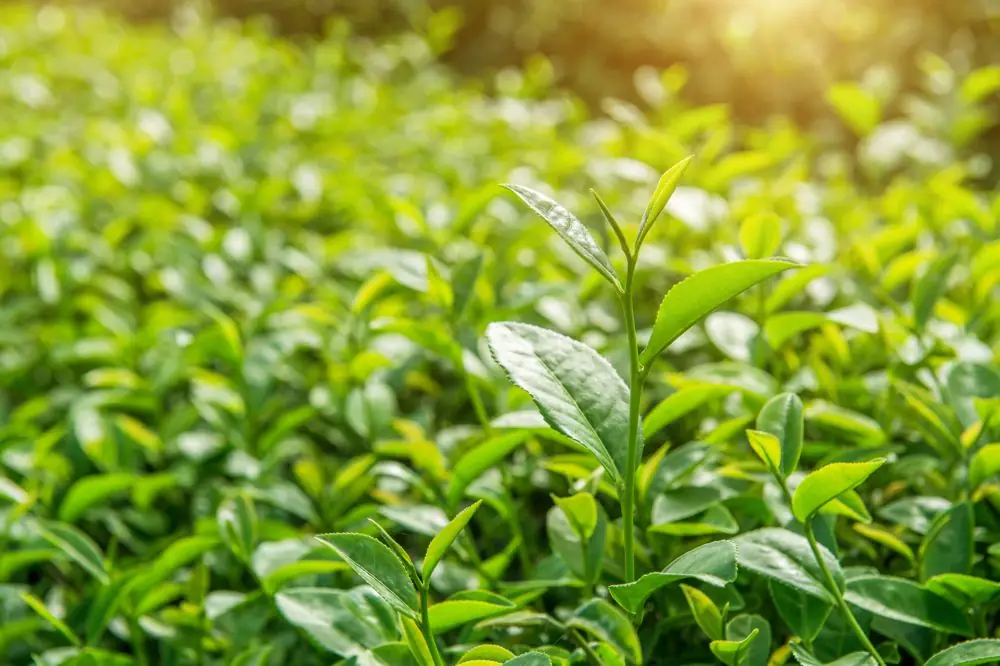
Green Tea Can Help You Live Longer
A large-scale study conducted in Japan in 2006 provides the definitive answer to the question of whether green tea is good for health or not. As all the above-described health benefits contribute to good overall health, which in turn directly influences longevity, the duration of life of both tea drinkers and non-drinkers was examined. It was found that those who drank at least 5 cups of this beverage per day had considerably lower chances of dying:
- Deaths from heart disease were 22% lower in men and 31% lower in women;
- Deaths from stroke were 35% lower in men and 42% lower in women;
- Lastly, deaths of all causes were 12% lower in men and 23% lower in women.
The results are unequivocal: if you want to enjoy better health and live longer, drink green tea every day.
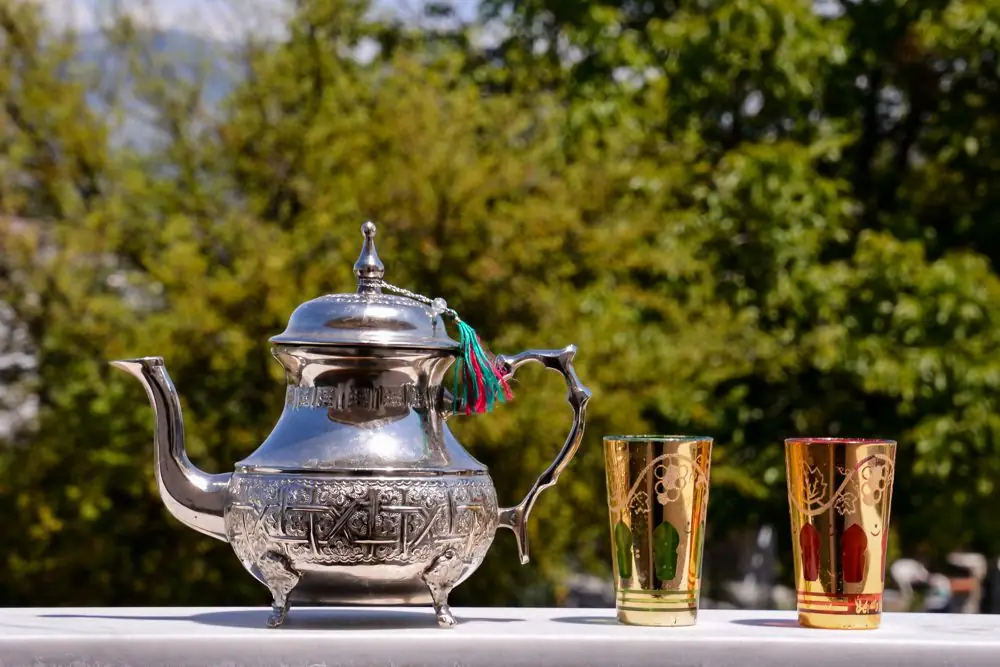
Does Caffeine in Green Tea Make You Feel Better Focused?
First of all, although it is often said that black and green teas contain theine instead of caffeine, these compounds are really the same, and there are absolutely no chemical differences between them.
While both green and black teas are rich in caffeine, a well-known stimulator of the nervous system, their stimulating effect is not as pronounced as that of coffee for a number of reasons:
- The caffeine you get from coffee is released very quickly, so there is a pronounced peak in its action.
- Polyphenols (tannins and catechins) in the greener variety bind to caffeine so that it is released into the bloodstream much more slowly and at a steady rate. (As there are fewer polyphenols in the blacker variety, the caffeine you get from this beverage starts to act noticeably faster).
- Both green and black teas contain L-theanine, a compound that relaxes your nervous system and offsets the effect of caffeine.
- Both green and black teas also contain therubigins: organic compounds that noticeably reduce the effect of caffeine on your body.

All in all, in sharp contrast to coffee, green and black teas do not overstimulate your nervous system and can help you concentrate and stay focused for a considerably longer time. This beverage is ideal if you need to get alert and more productive but want to avoid nervousness and irritation, which are known side effects of drinking coffee.
Why Green Tea Is Good for Weight Loss
There are several reasons why this tangy beverage can help you shed pounds:
- Caffeine it contains is a well-known appetite suppressant that also stimulates you and helps you use the calories you get from your food faster
- Catechins it is rich in were found to speed up the rate of metabolism and burn fat
A 2012 study concludes that a combination of caffeine and catechins helps reduce hunger and makes you feel full. In an older small-scale study people who received caffeine and catechins demonstrated a 4% increase in calories burned. In a more recent 2008 study catechins increased fat oxidation by 17%.
While both green and black teas are definitely not a magic bullet when it comes to losing weight, they can be used as a safe and time-tested complementary remedy that can help you alleviate hunger pangs and feel full for a longer time.
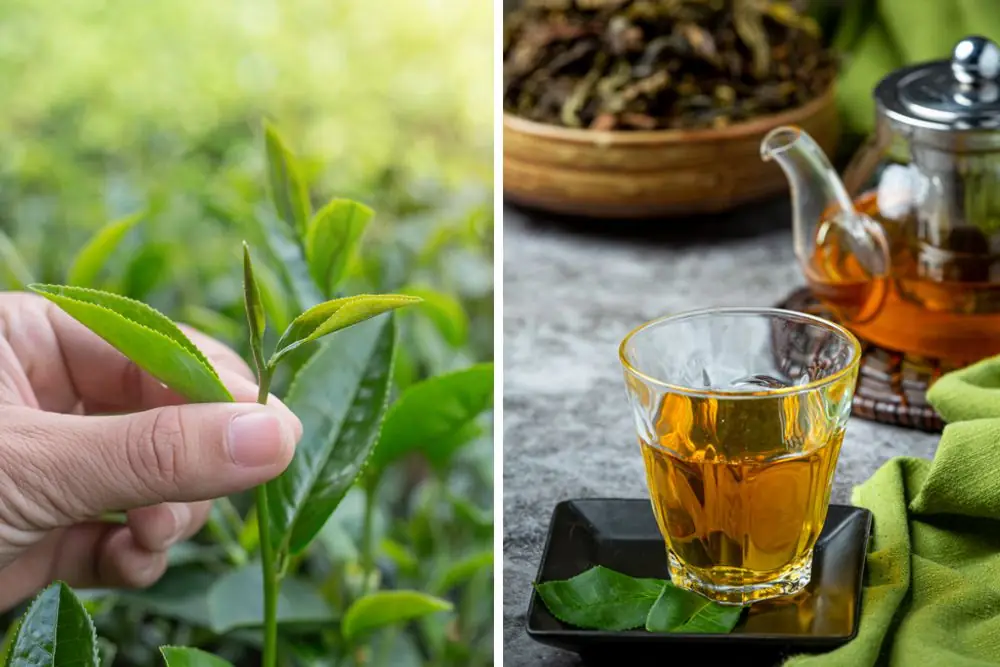
FAQs
In this section you will find the answers to the most common question about this beneficial beverage.
Is Green Tea Good for You Before Bed / at Night?
As described above, this beverage is rich in slowly-released caffeine, a natural stimulant that keeps us awake and alert but can also disrupt our sleep if consumed too late in the day. So, the answer to this question depends on whether you are sensitive to caffeine and what tea variety you use.
If you drink tea very often and the brand you use is not particularly rich in caffeine, it is not very likely that a cup of it will affect your sleep. If, on the other hand, you are not accustomed to tea, you might end up having difficulty falling asleep. What’s more, as caffeine increases urine output, you might wake up in the middle of the night because of the urge to go to the bathroom.
Luckily, herbal and decaffeinated teas are great alternatives to traditional beverages that contain caffeine. Chamomile, peppermint, and rooibos teas are especially known for their calming and relaxing properties. If you have trouble falling asleep, switching to herbal or decaffeinated teas at the end of the day can be a great way to unwind and promote better sleep.

Which Tea Is Better for You: Green or Black?
While the greener variety is exposed to the air (and oxidation) for no more than 2 days, the blacker one can be allowed to oxidize for as long as one month. For this reason, these two varieties do not have the same health benefits.
Green tea is made from (mostly) unoxidized leaves and contains high quantities of antioxidants, specifically polyphenols (also called catechins), which are believed to strengthen the immune system, delay cell aging, and reduce water retention while promoting the elimination of toxins. What’s more, this variety contains copious amounts of L-theanine, which is believed to have a relaxing effect and reduce stress levels. The caffeine content of the greener variety is 11 to 20 mg per 1 gram; when it is brewed, catechins combine with caffeine and reduce its activity.
Black tea is made from fully oxidized tea leaves and contains a high amount of theaflavins, which are believed to help regulate blood sugar levels, combat diabetes, and reduce cholesterol. Additionally, theaflavins are said to help alleviate headaches and anxiety. Just like the green variety, the black one is also rich in L-theanine, which has a soothing effect. The blacker variety contains more caffeine (22 to 28 mg per 1 gram), and there are far fewer catechins to limit its action. Due to prolonged oxidization, this variety is not very rich in antioxidants.
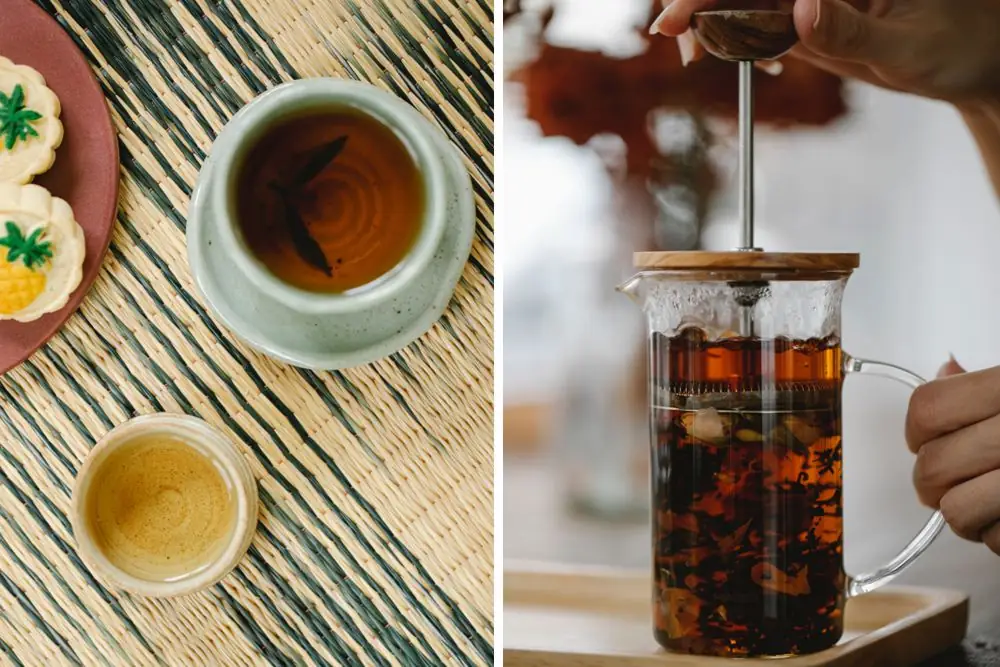
To sum up, both types offer health benefits that are worth considering. The black one, however, can have a more pronounced stimulating effect due to its higher caffeine content.
Is Green Tea Good for You when You Are Pregnant?
This drink is believed to be a very good choice for pregnant women as long as they do not exceed the recommended limit of 200 milligrams of caffeine per day. Luckily, there are only about 29 milligrams of caffeine per cup of this tea variety. If you do not drink other caffeinated beverages, you can enjoy as many as 7 cups of this beverage per day, which is quite a lot.
How Many Cups of Green Tea a Day is Healthy?
The highest safe daily intake of caffeine is 400 mg per day which equals 2-4 cups of coffee or as many as 14 cups of green tea. This number is also the answer to the question of how much green tea is good for you: as long as you do not drink more than 14 cups of this beverage per day, you receive copious amounts of antioxidants and L-theanine while not experiencing the unwanted side effects of caffeine overdose. So, is it good to drink a lot of green tea? Yes, it is — if by saying an ‘a lot,’ you mean no more than 14 cups.

Is One Green Tea Cup a Day Good for You?
One cup a day will definitely do you nothing but good, but, as shown above, you can safely drink a lot more cups of this beverage during your day without any risks of adverse effects.
How Is Matcha Green Tea Good for You?
Matcha is a powdered form of green tea that is mainly manufactured in Japan. It is extremely high in antioxidants and contains copious quantities of L-theanine.
There is a 2018 small-scale study that demonstrates that due to high L-theanine content consuming matcha can help reduce anxiety and stress. Still, depending on the quality of the powder, a cup of matcha can contain 38–176 mg of caffeine, so you cannot drink it as freely as regular teas.

Are Green Tea Bags Good for You?
Unfortunately, there is no clear answer to this question:
- Loose leaf products are made from whole leaves and have a better and more nuanced taste. What’s more, they are believed to contain more bioactive compounds;
- Teabags usually feature small particles (‘dust’) of low-quality tea and have a taste that is inferior compared to loose-leaf products. Still, due to the minuscule size of the ‘dust,’ the bioactive compounds it contains can more easily get into the boiling water.
- More often than not, teabags include stems of the plant that, while being cheap, contain more L-theanine than the leaves.
The only thing that can be said for sure is that as long as you enjoy your beverage, it is good for you.

Now you know why green tea is good for you and how many cups of this tangy beverage can be enjoyed per day. It needs to be said, though, that no individual food or drink is a magic bullet: it is important that you always eat a balanced diet, have no unhealthy habits, and exercise regularly.